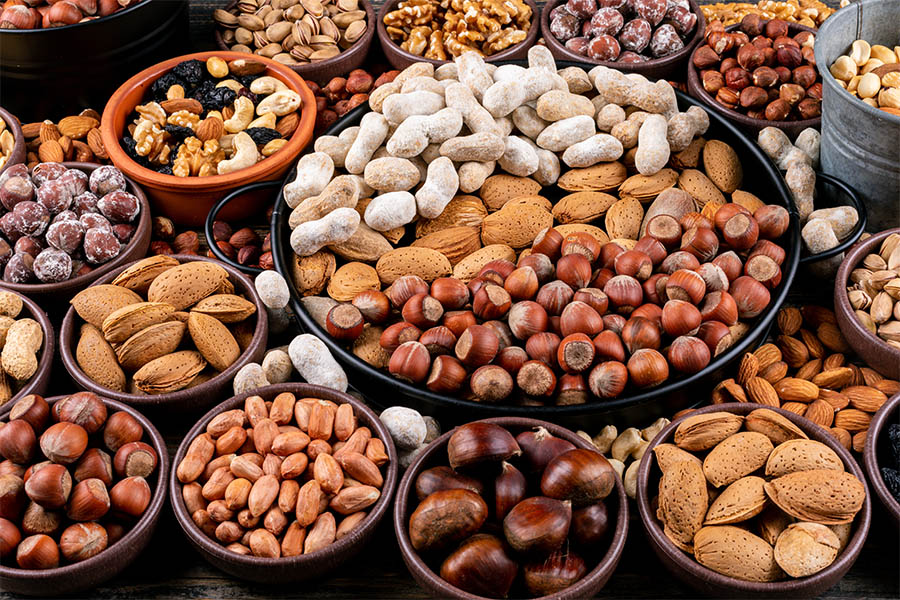Pregnancy is a crucial period in a woman’s life that requires special attention to nutrition and health. A well-balanced diet during pregnancy can ensure the optimal growth and development of the fetus and reduce the risk of pregnancy complications. Nuts are a nutrient-dense food that is a great source of essential nutrients, such as protein, fiber, healthy fats, vitamins, and minerals. However, many pregnant women are hesitant to eat nuts due to concerns about their safety and potential risks. In this article, we will explore the benefits, risks, and recommendations of eating nuts during pregnancy.
Benefits of Eating Nuts during Pregnancy
Nuts are a healthy food that provides several benefits for pregnant women and their fetuses. Here are some of the benefits of eating nuts during pregnancy:
- Nutrients: Nuts are a great source of essential nutrients, such as protein, fiber, healthy fats, vitamins, and minerals. These nutrients are essential for the optimal growth and development of the fetus and can also improve the mother’s health.
- Brain Development: Nuts are rich in omega-3 fatty acids, which are essential for the development of the fetal brain and nervous system. Eating nuts during pregnancy can improve cognitive function and reduce the risk of developmental disorders.
- Digestion: Nuts are high in fiber, which can help alleviate constipation, a common problem during pregnancy. Eating nuts can promote regular bowel movements and improve digestion.
- Gestational Diabetes: Nuts are a low glycemic index food that can help regulate blood sugar levels and reduce the risk of gestational diabetes.
- Blood Pressure: Nuts are rich in potassium, which can help lower blood pressure and reduce the risk of hypertension during pregnancy.
Risks of Eating Nuts during Pregnancy
Despite the many benefits of eating nuts during pregnancy, there are some risks that need to be considered. Here are some of the risks of eating nuts during pregnancy:
- Allergies: Nuts are a common food allergen, and some people may have an allergic reaction to nuts. If a pregnant woman is allergic to nuts, she should avoid them during pregnancy.
- Weight Gain: Nuts are a calorie-dense food, and excessive consumption can lead to weight gain. Pregnant women should eat nuts in moderation and avoid overindulging.
- Contamination: Nuts can be contaminated with bacteria, such as Salmonella and E. Coli, which can cause food poisoning. Pregnant women should ensure that nuts are properly stored and cooked to reduce the risk of contamination.
Recommendations for Eating Nuts during Pregnancy
Based on the benefits and risks of eating nuts during pregnancy, here are some recommendations:
- Choose Nuts Wisely: Not all nuts are created equal, and some nuts are healthier than others. Pregnant women should choose nuts that are high in essential nutrients, such as almonds, walnuts, and pistachios.
- Eat in Moderation: While nuts are a healthy food, they are also calorie-dense, and excessive consumption can lead to weight gain. Pregnant women should eat nuts in moderation and avoid overindulging.
- Avoid Allergies: If a pregnant woman is allergic to nuts, she should avoid them during pregnancy. If she is not sure if she is allergic, she should consult her doctor before consuming nuts.
- Proper Storage and Cooking: Nuts can be contaminated with bacteria, such as Salmonella and E. Coli, which can cause food poisoning. Pregnant women should ensure that nuts are properly stored and cooked to reduce the risk of contamination.
- Consult with a Doctor: Pregnant women should consult with their doctor or a registered dietitian before making any changes to their diet, including adding nuts. They can provide personalized recommendations based on the woman’s health status and pregnancy needs.
- Incorporate Nuts into a Balanced Diet: Nuts are a healthy addition to a well-balanced diet, but they should not be the only source of nutrients. Pregnant women should incorporate nuts into their diet along with other nutrient-dense foods, such as fruits, vegetables, whole grains, and lean protein.
Conclusion
In conclusion, nuts are a nutrient-dense food that can provide several benefits for pregnant women and their fetuses. They are a great source of essential nutrients, such as protein, fiber, healthy fats, vitamins, and minerals, that are essential for optimal growth and development. However, pregnant women should also be aware of the risks of eating nuts, such as allergies, weight gain, and contamination. By choosing nuts wisely, eating in moderation, avoiding allergies, properly storing and cooking, and consulting with a doctor, pregnant women can safely and effectively incorporate nuts into their diet to promote optimal health for themselves and their babies.

